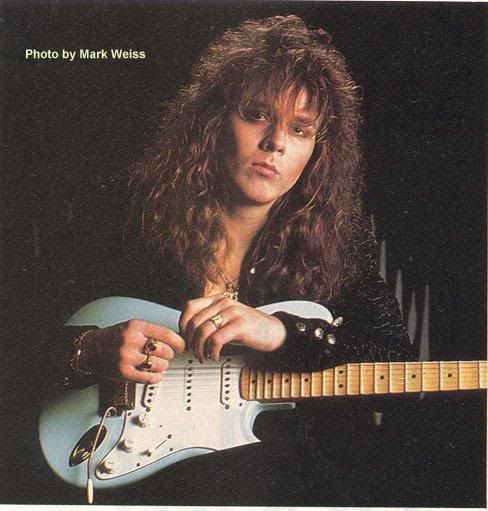
Yngwie Malmsteen was born in Stockholm, Sweden, on June 30, 1963. The youngest child in a household that included his mother Rigmor, sister Ann Louise, and brother Bjorn, Yngwie originally had no interest in music. However, on September 18, 1970, Yngwie saw a TV special on the death of guitar iconoclast Jimi Hendrix. Seven-year-old Yngwie watched with awe as Hendrix blasted the audience with torrents of feedback and sacrificed his guitar in flames. The day Jimi Hendrix died, the guitar-playing Yngwie was born.
Applying his intense curiosity and tenacity to first an old Mosrite and then a cheap Stratocaster, Yngwie immersed himself in the music of such bands as Deep Purple and spent long hours practicing to learn their songs. His admiration for Ritchie Blackmore's classically influenced playing led him back to the source: Bach, Vivaldi, Beethoven, and Mozart. As Yngwie absorbed the classical structures of the masters, his prodigious style began to take shape. By age 10, he began to focus all his energies into music. His mother and sister, a talented flautist, recognized his unique musical gifts and gave him support and encouragement. His mastery of the instrument progressed rapidly. In his early teens, Yngwie saw a television performance of Russian violinist Gideon Kremer, who performed the highly difficult 24 Caprices of 19th century virtuoso violinist Niccolo Paganini. The effect was profound, and Yngwie understood at last how to combine his love of classical music with his burgeoning guitar skills and onstage charisma.
By age 15, Yngwie's trademark style had begun to emerge. He worked for a time as a luthier in a guitar repair shop, where he encountered a scalloped neck for the first time when a 17th century lute came into the shop. Intrigued, Yngwie scalloped the neck of an old guitar in similar fashion and was impressed enough with the results to try it on his better guitars. The scalloped fret board was somewhat more difficult to play than a normal neck, but his control over the strings was so improved that Yngwie immediately adopted it as a permanent alteration to his equipment.
About this time, Yngwie began playing in a number of bands built around his explosive guitar style, with long instrumental explorations. Around age 18, Yngwie and several friends recorded a demo set of three songs for Swedish CBS, but the cuts were never released. Frustrated, Yngwie began sending demo tapes to record companies and music contacts abroad. One such tape found its way into the hands of Guitar Player contributor and Shrapnel Music founder Mike Varney. Yngwie was invited to record with Shrapnel's new band Steeler--and the rest, as they say, is history.
From Steeler, Yngwie moved on to Alcatrazz, a Rainbow-style band, but it became clear that to fully develop his talents, Yngwie would have to go solo. Yngwie's first solo album, Rising Force (now considered the bible for neoclassical rock) made it to #60 on the Billboard charts, an impressive feat for a mostly instrumental guitar album with no commercial airplay. The album also gained Yngwie a Grammy nomination for best rock instrumental performance. He was voted Best New Talent in several reader's polls, Best Rock Guitarist the year after, and Rising Force became Album of the Year. Rising Force blazed a trail on the concert circuit that established Yngwie as one of rock guitar's brightest new stars and added a new genre to the music lexicon: neoclassical rock.


1 comment:
Elo INvented Neclassical Rock
Yngwie Malmsteen is known for Neo classical power metal
andraste
Post a Comment